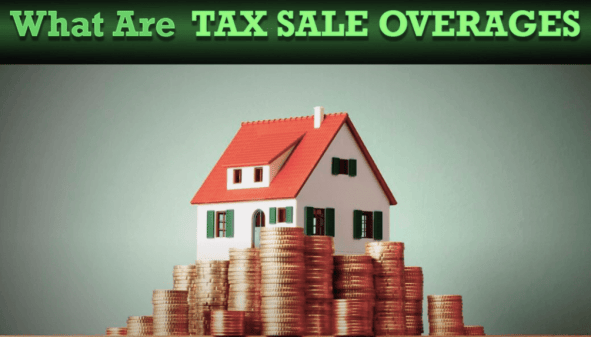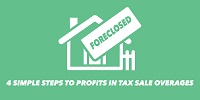All Categories
Featured
Table of Contents
Many of those property owners really did not even recognize what excess were or that they were even owed any type of surplus funds at all. When a home owner is incapable to pay building tax obligations on their home, they might lose their home in what is known as a tax obligation sale auction or a sheriff's sale.
At a tax obligation sale public auction, properties are sold to the greatest prospective buyer, however, in many cases, a residential or commercial property might cost greater than what was owed to the county, which results in what are referred to as excess funds or tax sale overages. Tax obligation sale excess are the money left over when a seized residential or commercial property is cost a tax obligation sale public auction for greater than the quantity of back taxes owed on the home.
If the building costs greater than the opening bid, after that overages will certainly be generated. Nevertheless, what most home owners do not know is that several states do not permit counties to maintain this money for themselves. Some state statutes dictate that excess funds can just be asserted by a couple of parties - including the individual that owed taxes on the residential or commercial property at the time of the sale.
If the previous property proprietor owes $1,000.00 in back taxes, and the property offers for $100,000.00 at auction, after that the legislation specifies that the previous building owner is owed the difference of $99,000.00. The region does not reach keep unclaimed tax excess unless the funds are still not declared after 5 years.
Expert-Driven Tax Sale Overages Blueprint Foreclosure Overages List
Nonetheless, the notification will usually be mailed to the address of the property that was sold, but because the previous home owner no more lives at that address, they commonly do not receive this notice unless their mail was being sent. If you remain in this situation, do not allow the federal government maintain cash that you are entitled to.

Every so often, I hear talk about a "secret brand-new possibility" in business of (a.k.a, "excess proceeds," "overbids," "tax obligation sale surpluses," etc). If you're completely not familiar with this idea, I would love to give you a quick overview of what's taking place right here. When a property proprietor quits paying their home taxes, the regional municipality (i.e., the county) will certainly await a time before they take the residential property in foreclosure and sell it at their yearly tax obligation sale public auction.
The details in this write-up can be influenced by lots of one-of-a-kind variables. Expect you own a property worth $100,000.
Advanced Real Estate Overages Strategy Tax Auction Overages

At the time of foreclosure, you owe concerning to the area. A few months later on, the area brings this residential property to their yearly tax sale. Here, they market your building (in addition to dozens of various other delinquent buildings) to the highest possible bidderall to recoup their lost tax revenue on each parcel.
Many of the investors bidding process on your residential or commercial property are fully mindful of this, as well. In numerous cases, homes like yours will receive proposals Much beyond the quantity of back taxes actually owed.
However get this: the county just needed $18,000 out of this building. The margin in between the $18,000 they required and the $40,000 they got is known as "excess profits" (i.e., "tax obligation sales overage," "overbid," "excess," and so on). Many states have statutes that prohibit the county from maintaining the excess repayment for these buildings.
The area has policies in place where these excess earnings can be declared by their rightful owner, typically for an assigned duration (which varies from state to state). If you lost your residential or commercial property to tax repossession since you owed taxesand if that property consequently marketed at the tax sale public auction for over this amountyou could feasibly go and accumulate the distinction.
Top-Rated Tax Foreclosure Overages Learning Unclaimed Tax Sale Overages
This includes showing you were the previous owner, completing some documents, and awaiting the funds to be delivered. For the typical person that paid full market worth for their home, this method does not make much sense. If you have a severe amount of cash invested into a property, there's way also much on the line to just "allow it go" on the off-chance that you can milk some extra cash money out of it.
For instance, with the investing technique I use, I can get residential or commercial properties free and clear for dimes on the buck. To the shock of some financiers, these bargains are Assuming you know where to look, it's frankly simple to locate them. When you can purchase a property for a ridiculously inexpensive rate AND you recognize it's worth substantially greater than you paid for it, it might effectively make good sense for you to "roll the dice" and try to accumulate the excess earnings that the tax obligation repossession and auction process generate.
Foreclosure Overages Tax Auction Overages
While it can absolutely pan out comparable to the means I have actually defined it above, there are additionally a couple of drawbacks to the excess proceeds approach you really should certainly know. County Tax Sale Overage List. While it depends greatly on the features of the residential property, it is (and in some instances, likely) that there will certainly be no excess profits generated at the tax sale public auction
Or possibly the region does not generate much public passion in their public auctions. Either method, if you're purchasing a residential or commercial property with the of allowing it go to tax obligation repossession so you can accumulate your excess earnings, what if that cash never comes through?
The very first time I sought this method in my home state, I was informed that I really did not have the choice of asserting the surplus funds that were produced from the sale of my propertybecause my state didn't enable it (Real Estate Overage Recovery). In states similar to this, when they generate a tax sale excess at a public auction, They simply keep it! If you're believing regarding using this method in your company, you'll intend to believe lengthy and hard about where you're working and whether their regulations and laws will certainly even allow you to do it
Bob Diamond Tax Overages Blueprint Tax Foreclosure Overages
I did my finest to give the appropriate solution for each state above, but I would certainly recommend that you prior to proceeding with the presumption that I'm 100% correct. Keep in mind, I am not a lawyer or a CPA and I am not trying to offer out professional legal or tax suggestions. Talk with your lawyer or CPA prior to you act upon this info.
Latest Posts
How Does Investing In Tax Liens Work
What Is Tax Lien Investing
Buying Tax Delinquent Property Before Auction